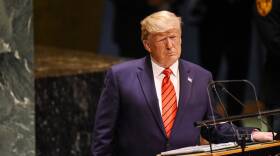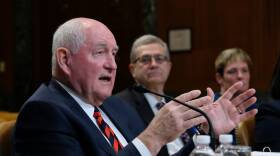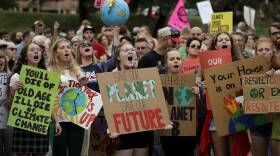EXPLORE MORE
Monday on BPR, live from Brighton:
Brown University gun violence scholar Ieva Jusionyte
Princeton University's Khalil Gibran Muhammad
Food policy analyst Corby Kummer
Comedian Jimmy Tingle
Co-founders of Boston HEAT (Human Exploitation Advocacy Team)
Recent segments
-
Alex Beam: Funerals Are Better Than Weddings
The Boston Globe columnist joined Jim and Margery to dig himself out of that six-foot hole. -
In His New Book, Robert Kuttner Outlines What's At Stake In 2020
In January 2021, the person inhabiting the White House has to be a progressive, according to Kuttner. -
John King: Support For Impeachment In The House Is Growing
The recent scandal involving President Trump and the president of Ukraine has mobilized Democrats to launch an impeachment inquiry. -
Karen Spilka On Hands-Free Driving Bill: 'We Should Be Able To Do This'
The Massachusetts Senate president stopped by the Boston Public Library to discuss a range of statewide policy issues. -
USDA Relocation Is Part Of Trump's 'War On Science,' Says Corby Kummer
The move will force many researchers to give up their jobs, threatening their robust climate science research. -
Bill McKibben: Climate Deniers Are 'Beginning To Peter Out'
The sheer number of climate protestors on Friday signals that a turning point has arrived, says McKibben.
Listen to previous shows
-

BPR Full Show: Food on Tape
Today on Boston Public Radio we're on tape, replaying some of our favorite conversations about food and cooking: Joanne Chang talks about her latest book inspired by her baking journals, “Pastry Love: A Baker’s Journal of Favorite Recipes.” Chang is a James Beard award winning pastry chef. Bren Smith shares different ways to eat kelp in his book “Eat Like a Fish: My Adventures Farming the Ocean to Fight Climate Change.” Smith is a former commercial fisherman and executive director of the non-profit GreenWave, focused on regenerative farming in water ecosystems. Dolores Huerta talks about why her work as a labor leader for farm workers’ rights remains as relevant today as it was in the 1960s, and about coining the phrase “Sí, se puede.” Huerta is an activist and co-founder of the National Farmworkers Association alongside Cesar Chaves. Andrew Li and Irene Li share food and tips from their latest cookbook, which they wrote with their sister Margaret Li: “Double Awesome Chinese Food: Irresistible and Totally Achievable Recipes from Our Chinese-American Kitchen.” Andrew Li and Irene Li are co-founders of the restaurant Mei Mei, along with their sister Margaret Li. -

BPR Full Show: Senator Elizabeth Warren Calls In
Today on Boston Public Radio: We begin the show by talking with listeners – including Senator Elizabeth Warren – about the country’s child care crisis, as families struggle to pay for care and centers downsize due to lack of staff. Shirley Leung discusses a proposal to house Mass. and Cass’ homeless population in an empty detention center, and the state of fundraising in the mayor’s race. Leung is a business columnist for The Boston Globe and a Boston Public Radio contributor. Callie Crossley talks about Tesla’s $137 million payment to a former Black employee for racial discrimination at work, the quilt exhibit at the Museum of Fine Arts and Georgia’s youngest farmer, a six year old girl. Crossley hosts GBH’s Under the Radar and Basic Black. Sue O’Connell weighs in on the New York Times’ article and subsequent Twitter controversy, “Who is the Bad Art Friend?”, and criticism of Dave Chappelle’s latest Netflix stand-up special. O’Connell is the co-publisher of Bay Windows and the South End News, as well as NECN's political commentator and explainer-in-chief. Andy Ihnatko breaks down Monday’s Facebook outage and the latest criticism facing the company following accusations by whistleblower Frances Haugen. Ihnatko is a tech writer and blogger, posting at Ihnatko.com. We end the show by asking listeners about their experiences with the Boston Marathon, as the race returns this Monday. -

BPR Full Show: A Tough Egg To Crack
Today on Boston Public Radio: Chuck Todd updates listeners on the latest political headlines, including a federal judge siding with the Justice Department to block the restrictive Texas abortion law, current negotiations over a possible debt limit extension and what motivates Senator Kyrsten Sinema. Todd is the moderator of “Meet the Press,” host of “Meet the Press Daily” on MSNBC and the political director for NBC News. Then, we talk with listeners about their thoughts on the early stages of the 2022 Massachusetts Governor race, including Donald Trump’s endorsement of former state Rep. Geoff Diehl. Andrea Cabral talks about the terrible conditions at Rikers Island, and how the Justice Department could be doing more work for police reform. Cabral is the former Suffolk County sheriff and the former Massachusetts secretary of public safety. She is currently the CEO of the cannabis company Ascend. Paul Reville discusses school board fights over mask mandates, and protests against legacy admissions in some of the country’s most elite universities. Reville is the former Massachusetts secretary of education and a professor at Harvard University’s Graduate School of Education, where he also heads the Education Redesign Lab. His latest book, co-authored with Lynne Sacks, is “Collaborative Action for Equity and Opportunity: A Practical Guide for School and Community Leaders.” Dan Carpenter weighs in on why it is taking so long to approve the COVID-19 vaccine for children aged 5-11, as Pfizer officially asks the Food and Drug Administration to issue Emergency Use Authorization. Carpenter is a professor of government at Harvard University, and oversees The FDA Project, a theoretical, historical and statistical analysis of pharmaceutical regulation in the United States as it is carried out by the F.D.A. His most recent book is “Democracy by Petition: Popular Politics in Transformation, 1790-1870.” Corby Kummer talks about the impact of the pandemic on the restaurant industry, Guy Fieri’s latest ventures and changing animal welfare laws that could raise egg prices in Massachusetts. Kummer is the executive director of the Food and Society policy program at the Aspen Institute, a senior editor at The Atlantic and a senior lecturer at the Tufts Friedman School of Nutrition Science and Policy. We end the show by asking listeners their thoughts on the potential for higher egg prices, as laws increasing pen space for hens are set to go into effect on Jan. 1, 2022. -

Corby Kummer: "There's Not Going to Be An Egg Shortage" in Massachusetts
Massachusetts state legislators may revise a 2016 ballot law on animal welfare to prevent a potential statewide egg shortage. Award-winning food writer Corby Kummer joined Boston Public Radio on Thursday to share his thoughts on this, and more. “First of all, there’s not going to be an egg shortage,” Kummer said. “It’s only an economic measure to protect farmers.” While the law also contains enclosure standards for pigs and calves, legislators are concerned with rules on acceptable enclosure space for egg-laying hens. According to the bill, egg-laying hens must be given at least 1.5 square feet of floor space and be able to fully extend both wings without touching the sides of the enclosure. In a measure to counteract the potential egg shortage, lawmakers are attempting to amend the enclosure requirements from 1.5 square feet to 1 square foot, following enclosure laws in other states. Unless legislators pass this amendment, the law will go into effect as written on Jan. 1, 2022. Representatives for egg farmers, supermarkets, and some animal rights activists support changes to the law, noting that vertical or multi-tiered aviary systems that allow hens to fly upwards, perch, and roost within 1 square foot. While Kummer acknowledged that some farmers may struggle economically to adjust enclosure spaces to fit this new rule, he believes that the idea of an egg shortage caused by enclosure regulations is an “excuse.” “This is another way for the industry to protect itself at the expense of animal welfare,” Kummer said. “But, if the country has enacted 1 square foot, then maybe Massachusetts should be consistent with that.” Kummer is the executive director of the Food and Society policy program at the Aspen Institute, a senior editor at The Atlantic and a senior lecturer at the Tufts Friedman School of Nutrition Science and Policy. -

BPR Full Show: Polyamorous Cats and Car-Eating Rats
Today on Boston Public Radio: Art Caplan talks about healthcare workers resigning following vaccine mandates, after New York’s largest healthcare provider lost 1,400 employees after a state mandate went into effect. Caplan is the Drs. William F. and Virginia Connolly Mitty Professor and founding head of the Division of Medical Ethics at NYU School of Medicine in New York City. Then, we hear from listeners about how they are planning for the holidays this year with the current status of the pandemic. Jim Aloisi and Stacy Thompson discuss why they think the MBTA is safe, how much they think the city should spend on transportation and the plan for the Mass. Pike development project in Allston. Aloisi is the former Massachusetts transportation secretary, a member of the Transit Matters board and a contributor to Commonwealth Magazine. Thompson is executive director of Livable Streets. Dr. Virginia Sinnott-Stutzman takes calls from listeners about caring for their pets, from dog food supply chain issues to combating kennel cough. Sinnott-Stutzman is a senior staff veterinarian at Angell Animal Medical Center.









